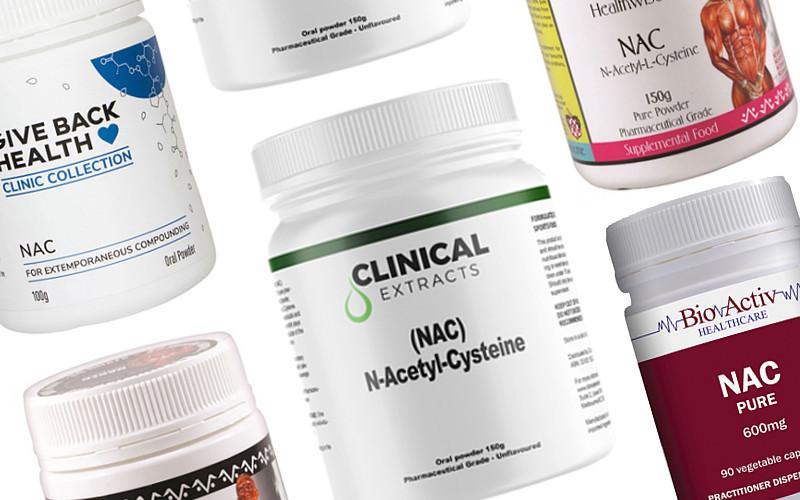What is NAC (N-acetyl cysteine)?

NAC (N-acetyl cysteine) is useful when it comes to treating inflammation in the lungs. NAC possesses mucolytic properties, which helps to loosen mucus. This is great for those who experience chesty coughs, asthma, bronchitis and other chronic respiratory conditions.3
Benefits of NAC (N-acetyl cysteine):
-
Beneficial for immune function
-
NAC (N-acetyl cysteine) works to detoxify environmental toxins.
- NAC (N-acetyl cysteine) possesses mucolytic properties
As of late, NAC has sparked a lot of curiosity within the health care community and amongst wellness professionals alike. Possessing countless benefits, with great success, this supplement has proven itself to be more than just a one hit wonder. Research over the years has suggested NAC to be beneficial for immune function, liver and kidney detoxification, mental health disorders and the treatment of chronic respiratory conditions.
What is NAC (N-acetyl cysteine)?
NAC, known as N-acetyl cysteine, is the supplement form of the semi-amino-acid, cystine, which can be found in high protein foods such as meats, poultry, eggs, legumes and whey protein. In order to maintain healthy liver function, robust immunity and strong muscles, cysteine is required.
Cysteine is also super important for antioxidant production. For instance, you may have come across the amino acid glutathione, a powerful antioxidant produced by your own cells to help ward off free radicals that are responsible for oxidative stress. Cysteine is the precursor for glutathione production and since oxidative stress may lend to the pathogenesis of conditions such as early ageing, Alzheimer’s and diabetes, synthesis of glutathione becomes crucial. It is also super vital for protein synthesis and nutrient metabolism.1
If cysteine levels are also low, the body relies on the breakdown of glutathione instead. We do not want to be low in cysteine and glutathione and therefore NAC can be taken as a supplement for that extra dietary boost2.
What is NAC (N-acetyl cysteine) used for?
NAC works to detoxify environmental toxins and drugs in the liver, heavy metals, pollutants and fat-soluble vitamins. This anti-inflammatory supplement is also superior when it comes to treating inflammation in the lungs. NAC possesses mucolytic properties, which helps to loosen mucus. This is great for those who experience chesty coughs, asthma, bronchitis and other chronic respiratory conditions.3
Recommended dosing of NAC is suggested to be anywhere between 1.2 - 2 grams daily. Also noteworthy is that adequate cysteine production also relies on the consumption of folate, B6 and B12 intake. For best results, ensure that your diet is replete with nourishing wholefoods sufficient in protein and the vitamins mentioned above.
Cautions
Always remember to speak to your healthcare professional when taking NAC in conjunction with other medicinal drugs.
Always remember to speak to your healthcare professional when considering the use of any supplements.
Side effects that may be caused by NAC include:
- Skin rash
- Vomiting
- Fatigue
- Diarrhea
Before considering using an NAC supplement, always speak to your healthcare professional if you have asthma or bleeding problems. Your healthcare professional may also tell you to stop using an NAC supplement 2 weeks before any elective surgery. If you're pregnant or breastfeeding, you must check with your healthcare professional before using NAC supplements.
NAC supplements May Like to View -
- Clinical Extracts NAC Powder | N-Acetyl-Cysteine - Click Here
- BioActiv Healthcare NAC Pure 600mg Capsules | N-Acetyl Cysteine Capsules - Click Here
- HealthWise NAC | N-Acetyl-L-Cysteine - Click Here
- Give Back Health NAC Powder - Click Here
1 Wu, G., Fang, Y., Yang, S., Lupton, J., Turner, N. (2004). Glutathione Metabolism and Its Implications for Health. The Journal of Nutrition 134(3), 489–492, https://doi.org/10.1093/jn/134.3.489
2 ILiving with MTHFR. (2021). Cysteine (C, CYS). https://www.livingwithmthfr.org/genetic-education/amino-acids/cysteine-ccys
3 Samuni, Y., Goldstein, S., Dean, OM., Berk, M. (2013). The chemistry and biological activities of N-acetylcysteine. Biochemica et Biophysica Acta 1830(8), 4117-29. https://doi.org/10.1016/j.bbagen.2013.04.016







